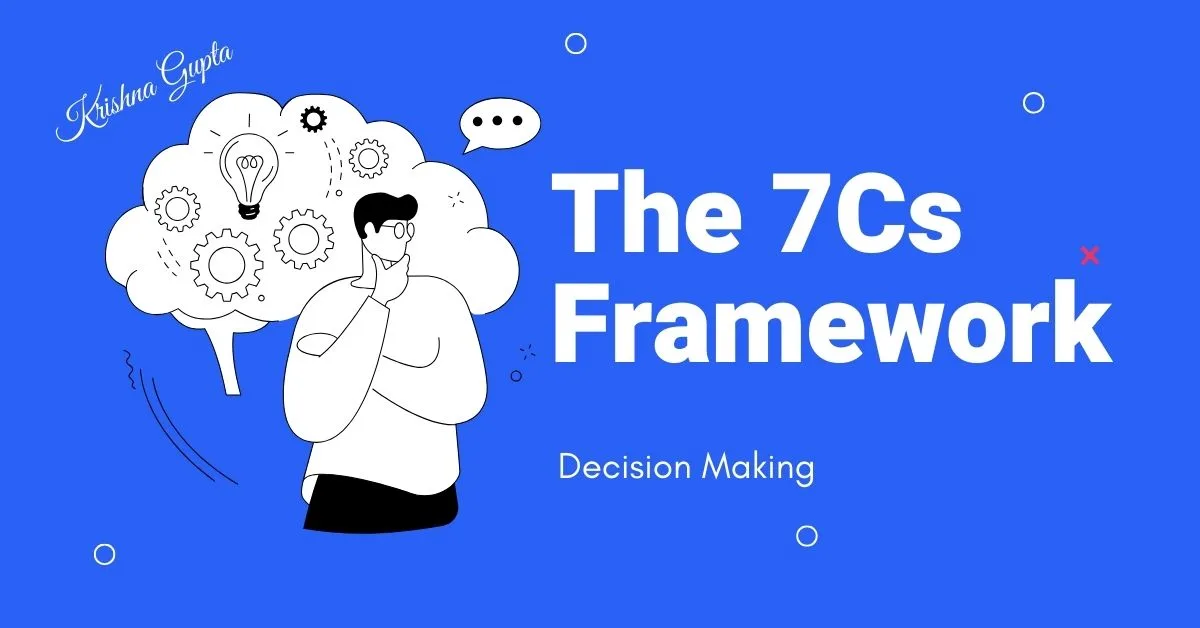Conquering Decisions with the 7Cs Framework: A Guide for Indian MSMEs
Making tough choices is inevitable in running any business, especially for ambitious small and medium-sized enterprises (MSMEs) like yours. But wading through a sea of uncertainties can be daunting. That’s where the 7Cs framework comes in – a thoughtful, structured approach to decision-making that can empower you to navigate complex situations with greater confidence and clarity.
Who is it for?
This framework is your friend if you’re an Indian MSME owner or manager facing crucial decisions, be it expanding operations, launching a new product, or tackling a crisis. It shines when considering multiple factors and perspectives before making a well-informed choice.
Who should give it a pass?
If you thrive on spontaneity and gut instincts or operate in a highly dynamic environment where rapid decisions are paramount, the 7Cs might feel a tad cumbersome. But remember, even impulsive leaders can sometimes benefit from a structured approach.
The Power of Seven:
Each “C” represents a critical aspect to analyse before making a decision:
- Context: Understand the bigger picture – market trends, competitor landscape, industry regulations.
- Cause: Identify the root of the problem or opportunity you’re addressing.
- Consequences: Analyze the potential outcomes of each possible decision.
- Constraints: Define your limitations – budget, resources, and timeframes.
- Choices: Brainstorm all possible options, even unconventional ones.
- Criteria: Set clear benchmarks to evaluate each option against your goals.
- Commitment: Choose the most viable option and dedicate resources to its execution.
Benefits for Indian MSMEs:
- Holistic decision-making: Avoids overlooking crucial factors due to tunnel vision.
- Reduced risks: Minimizes the chances of costly mistakes by considering all angles.
- Increased confidence: Provides a sense of control and grounds decisions in objective analysis.
- Improved communication: Facilitates collaborative decision-making within your team.
- Strategic alignment: Ensures every choice aligns with your long-term business vision.
Remember:
- Adapt the framework: Don’t be afraid to tailor the 7Cs to your specific needs and industry.
- Seek input: Involve diverse perspectives from your team and stakeholders for richer analysis.
- Maintain flexibility: Unexpected situations might arise, so be ready to adjust your course.
The 7Cs framework is not a magic bullet but can be a powerful tool in your decision-making arsenal. By understanding its strengths and limitations, Indian MSMEs can leverage its structure to confidently navigate the ever-changing business landscape and propel themselves towards success.
So, the next time you’re faced with a tough choice, remember the 7Cs – Context, Cause, Consequences, Constraints, Choices, Criteria, and Commitment. They might be the key to unlocking the right decision and guiding your MSME towards a brighter future.
The 7Cs Framework is a valuable tool for developing effective marketing strategies, and it does so by considering a comprehensive range of factors that influence customer decisions. Let’s break down each element:
Product: This refers to the good or service being offered. The framework considers its features, benefits, quality, branding, and packaging.
Price: This involves determining the appropriate selling price for the product, considering production costs, competitor pricing, and customer value perception.
Place: This concerns the distribution channels and locations where the product will be available to customers, including online and offline options. Accessibility and convenience are key considerations.
Promotion: This refers to the communication strategies used to reach and engage target audiences with information about the product. It encompasses ads, public relations, social media optimisation, and other marketing campaigns.
People: This element highlights the importance of the human component of the marketing process. It focuses on training and motivating sales staff, providing excellent customer service, and building positive stakeholder relationships.
Process: This refers to the systems and procedures for delivering the product to customers. It includes order fulfilment, delivery, returns, and after-sales service. Ensuring a smooth and efficient process builds customer trust and loyalty.
Physical Evidence: This element is particularly relevant for intangible products or services. It refers to the tangible cues that customers use to evaluate the product, such as brochures, packaging, store environment, or the professionalism of service providers. Creating positive physical evidence builds confidence and reduces perceived risk.
By considering all seven of these Cs, marketers can develop holistic and well-rounded strategies that address the desires and fantasies of their target clients, ultimately leading to increased sales and brand success.
Here are the key advantages of using the 7Cs Decision Framework:
1. Comprehensive Perspective:
- It encourages thoroughly examining all relevant factors, reducing the likelihood of overlooking important information.
- Addresses internal and external factors, leading to more informed and aligned choices.
2. Structured Approach:
- Provides a straightforward, step-by-step process, making decision-making more organised and efficient.
- Guides users through a logical sequence of considerations, reducing potential confusion and biases.
3. Enhanced Objectivity:
- Encourages a balanced evaluation of evidence and perspectives, minimising the influence of personal opinions or emotions.
- Emphasises fact-based decision-making, leading to more rational and defensible choices.
4. Improved Communication:
- Facilitates clear communication and stakeholder collaboration by providing a common framework and terminology.
- Ensures everyone involved understands the decision-making process and the rationale behind choices.
5. Reduced Risk:
- Anticipates potential consequences and identifies constraints early on, enabling mitigating risks and avoiding costly mistakes.
- Encourages proactive risk assessment and contingency planning, leading to more resilient decisions.
6. Increased Confidence:
- It provides a sense of structure and control, boosting decision-makers’ confidence in their choices.
- Grounding decisions systematically can lead to greater conviction and commitment to implementation.
7. Strategic Alignment:
- It helps ensure that decisions are aligned with organisational goals, values, and long-term strategy.
- Promotes consistency and coherence in decision-making across different levels and departments.
8. Improved Learning:
- Facilitates reflection and evaluation of past decisions, promoting continuous improvement and organisational learning.
- Encourages analysis of outcomes and lessons learned, leading to better decision-making in the future.
